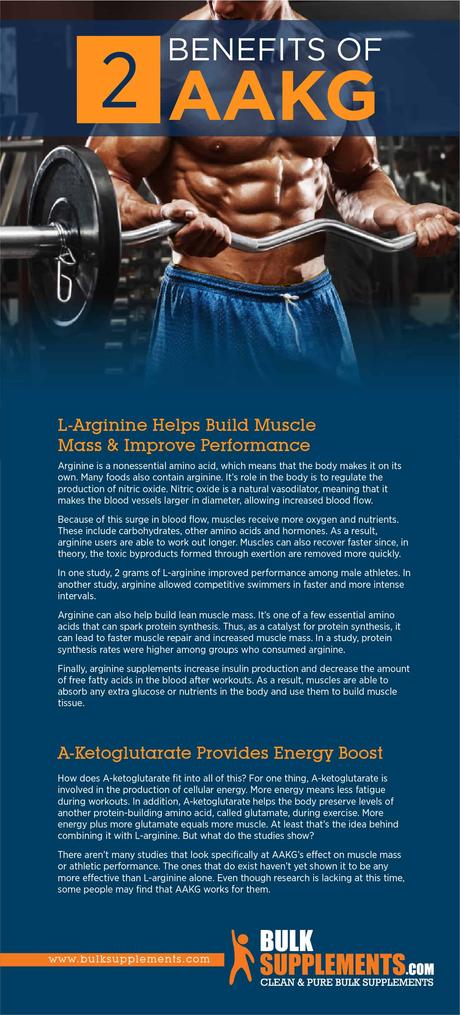What is L-Arginine A-Ketoglutarate?
Bodybuilders and athletes often have a special place in their hearts (and routines) for amino acid supplements. It’s no secret that amino acids promote stronger muscles and enhance athletic performance. And when they’re combined with other complimentary ingredients, they can be even more useful. That was the thinking behind the original formulation of the supplement called L-arginine A-ketoglutarate, or AAKG. As its name implies, it contains L-arginine, an essential amino acid which our bodies naturally produce. It also contains A-ketoglutarate, a multi-functional molecule also produced in the body.
L-arginine’s benefits are well documented. Some people, however, particularly those looking for a performance edge, are replacing their standard L-arginine supplement with AAKG. Is AAKG superior? There isn’t enough research yet to definitively tell, but plenty of athletes feel it improves their endurance and helps build muscle mass.
L-Arginine A-Ketoglutarate Benefits
There are two parts to an AAKG supplement — L-arginine and A-ketoglutarate. Each have a different function.
L-Arginine Helps Build Muscle Mass & Improve Performance
Arginine is a nonessential amino acid, which means that the body makes it on its own. Many foods also contain arginine. It’s role in the body is to regulate the production of nitric oxide (x). Nitric oxide is a natural vasodilator, meaning that it makes the blood vessels larger in diameter, allowing increased blood flow (x).
Because of this surge in blood flow, muscles receive more oxygen and nutrients. These include carbohydrates, other amino acids and hormones. As a result, arginine users are able to work out longer. Muscles can also recover faster since, in theory, the toxic byproducts formed through exertion are removed more quickly (x).
In one study, 2 grams of L-arginine improved performance among male athletes (x). In another study, arginine helped enhance competitive swimmers with faster and more intense intervals (x).
Arginine can also help build lean muscle mass. It’s one of a few essential amino acids that can spark protein synthesis. Thus, as a catalyst for protein synthesis, it can lead to faster muscle repair and increased muscle mass. In a study, protein synthesis rates were higher among groups who consumed arginine (x).
Finally, arginine supplements increase insulin production and decrease the amount of free fatty acids in the blood after workouts (x). As a result, muscles are able to absorb any extra glucose or nutrients in the body and use them to build muscle tissue.
A-Ketoglutarate Provides Energy Boost
How does A-ketoglutarate fit into all of this? For one thing, A-ketoglutarate is involved in the production of cellular energy. More energy means less fatigue during workouts. In addition, A-ketoglutarate helps the body preserve levels of another protein-building amino acid, called glutamate, during exercise (x). More energy plus more glutamate equals more muscle. At least that’s the idea behind combining it with L-arginine. But what do the studies show?
There aren’t many studies that look specifically at AAKG’s effect on muscle mass or athletic performance. The ones that do exist haven’t yet shown it to be any more effective than L-arginine alone (x). Even though research is lacking at this time, some people may find that AAKG works for them.

Food Sources of AAKG
The human body takes care of its own A-ketoglutarate requirements. It also produces arginine. However, arginine is still widely available in many types of foods such as:
- Walnuts (1 cup, chopped): 2,666 mg (x)
- Hard-boiled egg (1 large): 378 mg (x)
- Chicken breast (100 grams): 895 mg (x)
- Sunflower seeds (1 cup, hulled): 2,610 mg (x)
- Brown rice (1 cup, cooked): 341 mg (x)
- Plain whole milk yogurt (1 cup): 255 mg (x)
- Cashews (1 cup, halves & whole): 2,385 mg (x)
- Turkey (100 grams): 1,887 mg (x)
AAKG Side Effects and Dosage
A daily serving size of AAKG powder is 2,600 mg. Users can take this dosage up to 3 times per day for up to 80 days at a time (x). AAKG powder is best when mixed with water, protein shakes, or juice.
AAKG Side Effects
When used appropriately, AAKG is considered safe for healthy people to use (x). Side effects of AAKG are generally the same as side effects of l-arginine and can include upset stomach due to an accumulation of extra stomach acid. When side effects are experienced, they range from minor stomach pains and bloating to gout. It should not be used by people who are pregnant or nursing.
Due to the l-arginine, AAKG may interact with the following types of medications (x):
- Blood thinners
- Prescription painkillers
- Hormone therapy medication
- Erectile dysfunction medication
- High blood pressure medicine
- Nitrates
- Anticoagulants
- Water pills
- Diabetes medication
Because L-arginine lowers blood pressure, AAKG may interact with certain herbs and supplements. These include herbs and supplements that lower blood pressure and slow blood clotting. Here are some examples of herbs and supplements that may interact with AAKG:
- Fish oil
- Theanine
- Fenugreek
- Ginseng
- Turmeric
- Clove
Be sure to talk to your doctor before supplementing with AAKG. There is insufficient evidence surrounding AAKG use during pregnancy, so women who are pregnant or breastfeeding should not use it. Anyone who will soon undergo surgery should discontinue all supplementation beforehand.
The Bottom Line
Athletes commonly use l-arginine as a dietary supplement. By promoting nitric oxide production, it delivers fuel in the form of nutrient and oxygen-rich blood to the muscles. Adding a-ketoglutarate to boost cellular energy and preserve protein-building amino acids is now an option. Due to the lack of scientific studies on this combination, though, it’s unclear what value a-ketoglutarate adds, and for whom. Having said that, AAKG seems to be safe for those who can tolerate l-arginine. For athletes looking for the next best thing, there’s probably nothing to lose by giving it a shot!
